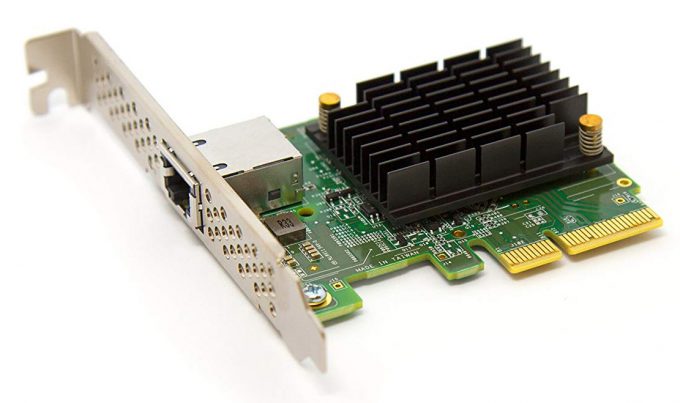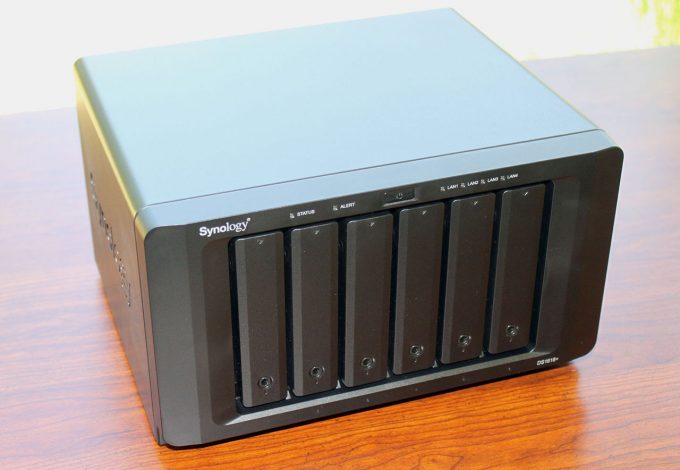- Qualcomm Launches Snapdragon 4 Gen 2 Mobile Platform
- AMD Launches Ryzen PRO 7000 Series Mobile & Desktop Platform
- Intel Launches Sleek Single-Slot Arc Pro A60 Workstation Graphics Card
- NVIDIA Announces Latest Ada Lovelace Additions: GeForce RTX 4060 Ti & RTX 4060
- Maxon Redshift With AMD Radeon GPU Rendering Support Now Available
Buttered With Btrfs – Synology DS1618+ 6-bay SMB NAS Review

Storing data is easy, but storing data reliably is a fair bit harder to pull off. Sure, RAID protects against a disk failure, but is not a safe backup solution in of itself, nor does RAID offer protection against data corruption. Synology’s DS1618+ solves this by offering a combined Btrfs & RAID solution in a 6-bay NAS that can be upgraded to meet practically any home or business need.
Page 3 – Final Thoughts
Final Thoughts
Synology’s DS1618+ is the long-awaited upgrade to its NAS lineup as the first to offer a faster 3000-Series Atom quad-core processor, a PCIe 3.0 expansion slot and DDR4 memory. With an $800 price tag it also becomes the most affordable Synology NAS that supports an upgrade to ECC RAM. Rather than a pair of 2GB modules, the unit utilizes just a single 4GB DDR4 SODIMM, allowing users to upgrade to 8GB by just buying a single matching 4GB module.
In fact, upgradability seems to be the design ethos behind the DS1618+, users have options to add an SSD fast-cache, 10GbE NICs, or simply plug in up to two 5-bay expansion units into the NAS to create a massive 16-drive storage behemoth. The unit readily supports backups via USB devices as well as common USB 3.0 wireless adapters and printers, plus automated cloud sync to a variety of cloud storage services.
On the software side, DiskStation Manager is a venerable OS that shows clear polish and access to an impressive array of features and settings, many I should state I’ve yet to even see on competing NAS offerings. That DSM has been in development for over 15 years, and it’s quite clear from its stability and focus on providing a range of tools most sysadmins would come to expect. That being said, DSM is still a closed OS, meaning a user can’t simply install random hardware such as an $80 Aquantia 10GbE NIC in the PCIe slot.
Home users are particularly unlikely to need a six-bay capacity NAS, but for any user, group, or business the additional logging, scheduled diagnostics, and bonus IronWolf Health Management make Synology’s NAS devices better than most at helping safeguard the data stored on them. Of course, security is as important as reliability, and DiskStation Manager features aggressive options to protect both the device itself as well as the user accounts on it. As another layer of security the newly added Security Advisor is a fresh start at unifying device security and can highlight unusual successful logins to the NAS.
Synology does offer a range of its own utilities in addition to a large curated list of third-party apps. Docker container support further expands upon the software apps and tools available to Synology users. Synology offers a range of certified virtualization options for businesses, and of course Plex support for home users that wish to use the NAS for streaming media.
One thing the NAS was designed for was backups. It features instant snapshot replication which is particularly useful for database and virtualization volumes, can perform automated incremental backups of desktop systems, and features Time Machine integration with for macOS backups as well. A proper 3-2-1- backup methodology is to store a final backup copy offsite, and of course Synology’s DiskStation Manager supports cloud storage and offsite backups toward that goal.
The DS1618+ seems close to the perfect NAS. The lack of integrated 10GbE on a large, high-performance SMB NAS such as the DS1618+ is not a deal-breaker, but the lack of support for multi-gigabit NBASE-T is what really does hold the NAS back from being the penultimate NAS solution. The C3538 processor is powerful enough that most drive/RAID configurations will see large file transfers bottlenecked by a single gigabit connection. Link aggregation readily solves this issue for businesses with suitable network deployments, but unfortunately not so much for home users.
Affordable networking gear offering 2.5Gbase-T and 5Gbase-T via standard RJ45 ethernet is at last becoming the de facto standard, however Synology’s own 10GbE NIC starts in the $240 range. Furthermore, Synology’s NICs are only available in SFP+ flavors with no Ethernet option available, which leaves only the aging Intel X540-T2 or T1 as the RJ45 expansion option available to home users.
In a business setting where SFP+ is standard and cost may be a minor concern, adding 10GbE will take up the sole PCIe expansion slot which may be a deal-breaker to those wishing to sensibly pair 10GbE with an SSD fast-access cache. Potential customers in need of 10GbE solutions and wishing to enjoy the full performance of the DS1618+ can find Synology’s NIC compatibility chart here.
Synology’s DS1618+ NAS may be targeted at small and medium businesses but it offers much to appeal to home users and sysadmins alike. Btrfs support offers a new level of data corruption prevention as well as efficient backups via near-instantaneous volume snapshots, something NAS alternatives cannot match with the EXT4 filesystem. With 14TB drives due to launch before the year is out the detection and automatic healing of silent data corruption will be more important than ever.
Those consumers looking for the utmost in data reliability will further appreciate the IronWolf Health Management integration with Seagate’s IronWolf and IronWolf Pro hard drives which allows for proactive monitoring and preventative warnings in conjunction. Ultimately all hard drives will fail, but preventative care and proactive monitoring at the hard drive level will help ensure they don’t fail sooner than they should, and also increase the odds of advanced warning before a HDD’s eventual demise.
At the end of the day there are few things the DS1618+ isn’t. It can become a NAS, FTP server, web server, mail server, or RADIUS server. It can host cloud shares as a personal cloud and office document shares with both Office 365 and Google Docs. It is certified for VMware, Hyper-V, Citrix, and OpenStack virtualization. It runs anything from GitLab to WordPress, OAuth service to VPN service. It can be a surveillance system or an active backup system with near-instant snapshot replication. One thing it isn’t is cheap, but for the performance, 6-bay capacity, and sheer range of possible uses Synology’s DS1618+ delvers incredible value.
We are hard pressed to find anything to fault with the DS1618+, in fact we could only come up with just one. The DS1618+ lacks built-in multi-gigabit capability, though for business networks four-port link aggregation will sidestep this limitation.
One of the major advantages Synology offers over competing NAS vendors is its Btrfs solution. In conjunction with RAID parity Btrfs will not only detect data corruption but automatically repair the file, thereby providing a much needed safeguard for ensuring the integrity of long term storage of your data. IronWolf Health Management integration can add yet another layer of protection for data stored on the NAS.
The Security Advisor makes securing the NAS easy for small businesses and home users, though the DS1618+ offers plenty of advanced security tools sysadmins look for too. Whether the priority is data reliability or data security Synology has positioned the DS1618+ to deliver both in spades with almost any hardware configuration possible to meet any need, and as such is worthy of our Editor’s Choice award.

Synology DS1618+ NAS
Support our efforts! With ad revenue at an all-time low for written websites, we're relying more than ever on reader support to help us continue putting so much effort into this type of content. You can support us by becoming a Patron, or by using our Amazon shopping affiliate links listed through our articles. Thanks for your support!






